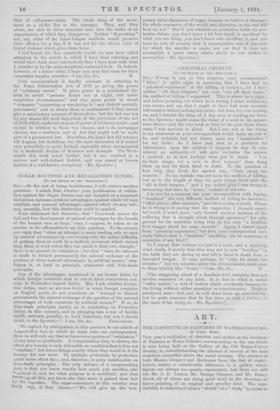SUGAR BOUNTIES AND RETALIATORY DUTIES. [To THE EDITOR Or THE
"SPECTATOR."] -StR.,—At the cost of being troublesome, I will venture another question. I asked, first, whether your justification of retalia- tion against the Sugar Duties was not founded on a supposed distinction between artificial advantages, against which we may retaliate, and natural advantages, against which we may not ; and, secondly, how this distinction eouid be applied.
Your statement last Saturday, that "Free-trade means the full and free development of natural advantages for the benefit of the human race at large," may, I suppose, be taken as an auswer in the affirmative to my first question. To the second, you reply that "when an attempt is made tending only to open up natural advantages by overcoming only the initial difficulty of getting them to work by a method, moreover, which cannot keep them at work unless they can stand in their own strength," there is no ground for retaliation ; but that "when the attempt is made to disturb permanently the natural exchange of the produce of these natural advantages by artificial means," reta- liation is, at least in principle, consistent with Frce-trade principles.
One of the advantages, mentioned in my former letter, by which foreign countries seek to out-do their competitors con- sists in Protective import duties. May I ask whether Protec- tive duties, such as are now levied in many foreign countries on English goods, do not constitute an "attempt to disturb permanently the natural exchange of the produce of the natural advantages of both countries by artificial means ?" If so, do Free-trade principles justify us in retaliating by Protective duties in this country, and in plunging into a war of hostile tariffs, welcome, possibly, to Lord Salisbury, but not, I should
think, to the Spectator ?---I am, Sir, &c., FREE-TRADE.
[We replied, by anticipation, to this question in our article of August 21st last, to which we must refer our correspondent. Here we will only say that we have never spoken of " retaliation " of any kind as justifiable. A compensating duty to destroy the effect of a bounty is only defensible on condition that it does not "retaliate," but leaves things exactly where they would be if the bounty did not exist. To retaliate protection by protection could never effect this ; and, therefore, is quite indefensible on Free-trade principles. The only defence of a compensating duty is that you know exactly how much you sacrifice, who 8“crifices it, and for what purpose it is sacrificed; and that know...„g all this, you know also that more is gained than lost by the 8.acrifice. The sugar-consumers in this country may fairly saye, if they choose,-1‘ We will give up the tem- porary extra cheapness of sugar, because we believe it deranges the whole commerce of the world, and, therefore, in the end will hurt us, too." But if you retaliate on protective duties by pro- tective duties, you don't know a bit how much is sacrificed by what you arc doing, you don't know who sacrifices, it, and you have no sort of security that it accomplishes any of the ends for which the sacrifice is made, nor yet that it does not accomplish a great many others which no one wishes to accomplish.—ED, Spectator.]














































 Previous page
Previous page